
U.S. Department of Justice
Office of the Inspector General
Audit Division
Federal Bureau of Investigation
Management Letter Report
Fiscal Year 1996
99-02
February 1999
* * * * *
TABLE OF CONTENTS
CASH DISBURSEMENTS/SIBAC INVOICING
REVIEW/APPROVAL OF CASH RECEIPTS
APPENDIX I - FEDERAL BUREAU OF INVESTIGATION'S RESPONSE TO THE AUDIT RECOMMENDATIONS
APPENDIX II - AUDIT DIVISION ANALYSIS AND SUMMARY OF ACTIONS NECESSARY TO CLOSE THE REPORT
COMMENTARY AND SUMMARY
The Federal Bureau of Investigation (FBI) is the principal investigative arm of the Department of Justice. It is charged with gathering and reporting facts, locating witnesses, and compiling evidence in criminal and civil matters in which the Federal Government is, or may be, an interested party. It also investigates violations of federal law in the criminal, civil, and intelligence fields, except those that have been assigned by legislative enactment or otherwise to another Federal agency. To achieve their mission, the FBI received $2.5 billion in direct appropriations for Fiscal Year (FY) 1996. In addition, reimbursable funding levels totaling about $393 million, provided the FBI with resources to participate in several joint-agency efforts, including Organized Crime Drug Enforcement Task Force, Regional Drug Intelligence Squads, and the Asset Forfeiture Program.
The Office of the Inspector General (OIG) contracted with KPMG Peat Marwick LLP, Certified Public Accountants, to perform the FY 1996 audit of the Federal Bureau of Investigation Statement of Financial Position as part of the Department of Justice’s (DOJ) effort to implement the Government Management Reform Act of 1994 (GMRA). The GMRA requires an annual financial statement audit of the DOJ beginning with FY 1996. The audit was conducted in accordance with generally accepted government auditing standards and the Office of Management and Budget Bulletin No. 93-06, “Audit Requirements for Federal Financial Statements.” The OIG performs an oversight role in the audit process and ensures compliance with the GMRA by monitoring the progress of the audit, reviewing supporting workpapers, coordinating the issuance of reports, and following up on findings and management letter issues.
The management letter was prepared by KPMG Peat Marwick as part of their audit of the FBI’s FY 1996 financial statement. The auditors were not contracted to perform control testing sufficient to enable them to express an opinion on management’s assertions over the effectiveness of internal controls or compliance with laws and regulations. Accordingly, they did not express such an opinion. However, they noted certain conditions involving the internal control structure and its operations. The management letter presents those internal control weaknesses that, in the independent auditor’s opinion, do not have a material effect on the financial statements, but are areas of the management process that could, in some way, affect the organization’s ability to record, process, summarize, and report financial data.
KPMG Peat Marwick, LLP noted conditions in the following areas: (1) cash disbursements, (2) cash receipts, (3) emergency funds, (4) accounts payable, (5) personnel record keeping, and (6) FBI’s property management system.
KPMG Peat Marwick also reviewed management’s process for evaluating and reporting on internal controls and accounting systems as required by the Federal Managers’ Financial Integrity Act (FMFIA), and compared the agency’s most recent FMFIA reports with the evaluation they conducted of the FBI’s internal controls. Their findings and recommendations in this area are addressed separately.
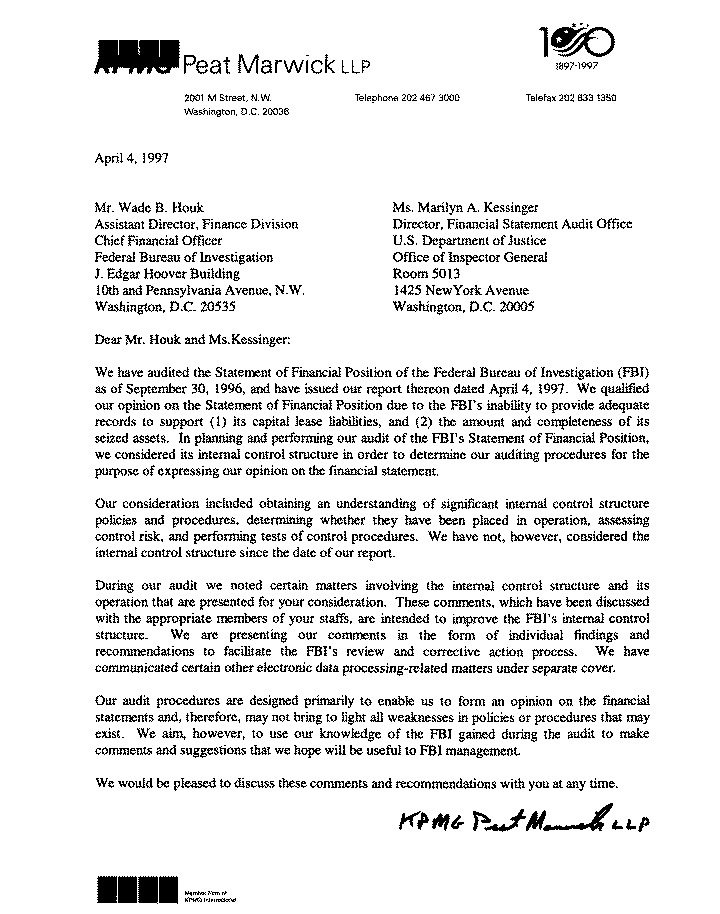
Federal Bureau of Investigation
September 30, 1996
Management Letter Comment No. 1
| Audit Area: | Cash Disbursements/SIBAC Invoicing |
| Condition: | General Services Administration (GSA) invoices for the FBI’s purchase
of routine supplies are often received late--sometimes as late as three years after
shipment of the goods. Also, the FBI is not always notified of order cancellations, so it
is not always clear if the FBI is paying GSA invoices after or before the goods
have been received. Failure to notify end users of canceled orders causes delays in
receiving the needed goods and unnecessary reviews of outstanding purchase orders. In addition, GSA payments cannot be posted to the FBI’s Financial Management System (FMS) until an electronic invoice is recorded in the GSA’s Simplified Intragovernmental Buying and Collections (SIBAC) system, thereby causing FMS to reflect inaccurate expenditure and payment information, making the reconciliation process difficult. |
| Criteria: | To ensure the proper payment of and accounting for goods and services, invoices must be promptly received, paid, and canceled. |
| Effect: | Because payments to GSA cannot be posted to FMS until an electronic
invoice is recorded in the SIBAC system, FMS may not accurately report expenditures and
payments for a given time period. Reconciliation of the Treasury balance to FMS may
require extensive follow-up to determine which purchase orders have actually been paid and
should be canceled. Failure to notify end users of canceled orders can cause delays in receiving needed items. Purchase Orders may remain outstanding for long periods of time and cause unnecessary follow-up by personnel to determine their status. Also, it is unclear whether GSA withdraws funds from the FBI account before or after goods are received. If funds are withdrawn before receipt, it follows that advances or receivables could be understated on the balance sheet. |
| Recommendation 1: | We recommend that the FBI work together with the GSA in an effort to develop a solution that will result in timely and accurate GSA billings that will allow the FBI to properly account for its GSA purchases and track its outstanding orders. |
Federal Bureau of Investigation
September 30, 1996
Management Letter Comment No. 2
| Audit Area: | Review/Approval of Cash Receipts |
| Condition: | During our cash receipts testwork, we noted that the General Ledger Unit’s (GLU) Schedules of Collections did not contain evidence of supervisory review and approval. |
| Criteria: | Standard internal control procedures include an independent check performed by someone other than the person who originally carried out an action. Also, OMB Circular A-123, Management Accountability and Control, requires that the documentation for transactions, management controls, and other significant events be clear and readily available for examination. |
| Cause: | FBI management indicated that Schedules of Collections are being reviewed and approved, as evidenced by supervisory signatures, however, because the schedules are microfilmed prior to such reviews, the signatures do not appear on the microfilm copy. |
| Effect: | Insufficient reviews and documentation of supervisory approval decrease the level of management control over cash receipts. Also, by microfilming the deposit tracking packets prior to approval, the microfilm may reflect incorrect information detected as part of the review/approval process. |
| Recommendation 2: | We recommend that the GLU revise its procedures by microfilming cash receipt deposit tracking packets after the supervisory review and approval takes place so that evidence of such review is documented on the microfilm copy. |
Federal Bureau of Investigation
September 30, 1996
Management Letter Comment No. 3
| Audit Area: | Cash Receipts |
| Condition: | Monies advanced to fund confidential activities may be returned for various reasons to the Treasury via electronic funds transfer (EFT). For one item of seventy-eight cash receipts sampled, there was a delay of four months from the time the wire transfer was received to the time the entry was recorded in the general ledger. |
| Criteria: | OMB Circular No A-123, Management Accountability and Control, requires that transactions be promptly recorded, properly classified, and accounted for in order to prepare timely accounts and reliable financial and other reports. |
| Cause: | The General Ledger Unit (GLU) forwards notification of wire transfers to Confidential Services to research and enter the accounts (case advances) to apply the wire transfers to. The delay occurs during the time Confidential Services takes to research and enter the appropriate transaction to liquidate the related advance before forwarding the accounting information back to the GLU for posting. |
| Effect: | Wire transfers that are received at the end of the fiscal year are not recorded in the related general ledger accounts until the following year. |
| Recommendation 3: | We recommend that Confidential Services and GLU review their current procedures for processing wire transfers and consider implementing new procedures that will increase the timeliness of recording the wire transfers. |
Federal Bureau of Investigation
September 30, 1996
Management Letter Comment No. 4
| Audit Area: | Emergency Funds |
| Condition: | Advances made to agents from the Emergency Petty Cash fund at the FBI’s New York field office were not liquidated within the required 10 day period. (Advances totaling $7,050 were still outstanding after thirty days from the date of the surprise cash count performed during the audit.) |
| Criteria: | Confidential Funding Guide, Section 6.3.3.1, requires that advances to Agents from the petty cash fund, for the purpose of paying confidential expenditures, be liquidated or returned within 10 working days from the date of the advance. |
| Cause: | The FBI is not monitoring compliance with its Confidential Funding Guide requirement for prompt liquidation of emergency fund advances. |
| Effect: | Failure to comply with the 10-day liquidation requirement suggests that use of emergency funds may not be being restricted for the established purpose intended by the Bureau (i.e., emergency cash shortages) and increases the opportunity for inappropriate use. Such practice may also drain the emergency fund, thereby leaving insufficient funding for true emergency needs. |
| Recommendation 4: | We recommend that the FBI ensure compliance with its policy for prompt liquidation of all advances-emergency or other advances-by designating to the fund cashier the responsibility for following-up on delinquent advances. |
Federal Bureau of Investigation
September 30, 1996
Management Letter Comment No. 5
| Audit Area: | Accounts Payable |
| Condition: | Third-party drafts are drawn on a zero balance account held at Mellon Bank. For every draft that is issued, the FBI must wire the amount of the draft to Mellon Bank for payment. When a third-party draft is issued, a liability to Mellon Bank is created in the general ledger. During our accounts payable testwork, we noted that detail documentation for the 9/30/96 balance reflected in the general ledger and the financial statements for account no. 2120.20 (Accounts Payable) was not readily available. |
| Criteria: | FASAB No. 1, Accounting for Selected Liabilities and Assets, (Payables) states that liabilities should be accrued for goods and services received from, progress in contract performance by, and rents due to other entities. Documentation to support the payables should be maintained and a reconciliation performed after year end to adjust the accounts to the actual amounts owed. |
| Cause: | Neither the Commercial Payments Unit or General Ledger Unit performed year-end reconciliations of the Mellon Bank third-party draft account. The 2120.20 Accounts Payable account balance on the general ledger was extracted from the FMS system without ensuring that the balance was reconciled to the Mellon Bank balance. |
| Effect: | The 9/30/96 balance of 2120.20 Accounts Payable was misstated by a combination of stop payment actions and other cancellations not reflected on the FMS system and incomplete transmission of wires received at Mellon Bank. |
| Recommendation 5: | We recommend that the Commercial Payments Unit perform a year-end reconciliation of the Mellon Bank third-party draft account and the results of the reconciliation be communicated to the General Ledger Unit, so that they may carry the reconciled balance on the general ledger and financial statements at year end. |
Federal Bureau of Investigation
September 30, 1996
Management Letter Comment No. 6
| Audit Area: | Personnel |
| Condition: | FBI personnel could not locate two of seventy-nine personnel files requested for review during the audit. We also observed that the personnel files were not maintained in an orderly fashion. |
| Criteria: | OMB Circular No. A-123, Management Accountability and Control, requires that documentation for transactions, management controls, and other significant events must be clear and readily available for examination. |
| Cause: | Lack of controls, or enforcement of controls, over maintenance of personnel records. |
| Effect: | The supporting documentation for personnel file information is not being maintained in a manner which best meets the recordkeeping and processing needs of the Bureau. |
| Recommendation 6: | We recommend that the Information Resources Division review the current file maintenance system and consider the steps needed to ensure the proper maintenance of personnel records (such as instituting a sign-out policy for the removal of files from the personnel office). |
Federal Bureau of Investigation
September 30, 1996
Management Letter Comment No. 7
| Audit Area: | Property Management System |
| Condition: | For assets under $25,000, five of seventy-five personal property items observed and tested in the field offices did not have Property Management Application (PMA) numbers affixed to them. Also, seven of the seventy-five items which did have PMA numbers affixed to them could not be traced to the PMA Master Property Listings for the related field office. |
| Criteria: | Justice Property Management Regulation (JPMR), Subpart 128-1.500-6, states that the Director of the FBI is responsible for establishing and administering a property management program to provide for creation and maintenance of complete and accurate inventory control and accountability record systems. All assets over $150 are to be entered in PMA and receive a PMA number, which is to be affixed to the asset. |
| Cause: | Other than negligence on the part of field office supply technicians, there was no apparent cause for not having PMA numbers affixed to the assets. For assets that could not be traced to the PMA Master Listings, FBI officials may have failed to enter in PMA the transfer of assets to other field offices. |
| Effect: | The PMA system does not reflect accurate inventory of all of the FBI’s assets under $25,000, thus the FBI is not in compliance with JPMR requirements. |
| Recommendation 7: | We recommend that the FBI reinforce its JPMR policies and procedures requiring its field offices to maintain a complete and accurate inventory of all PMA assets, including affixing PMA numbers to the assets. |
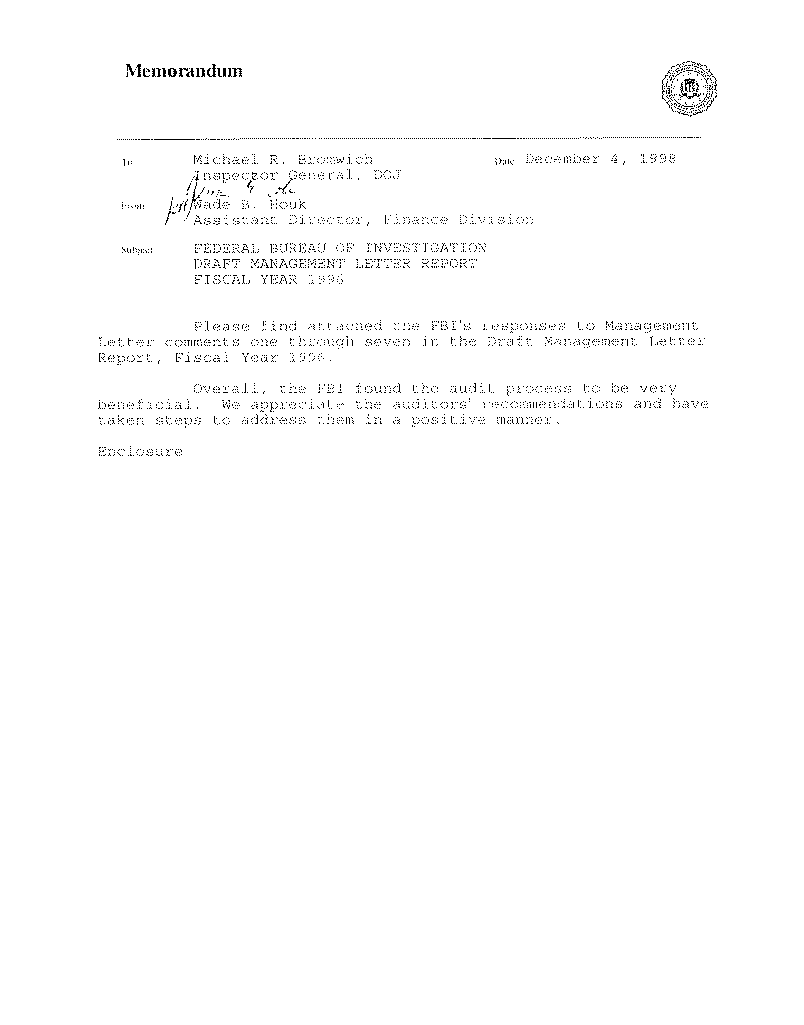
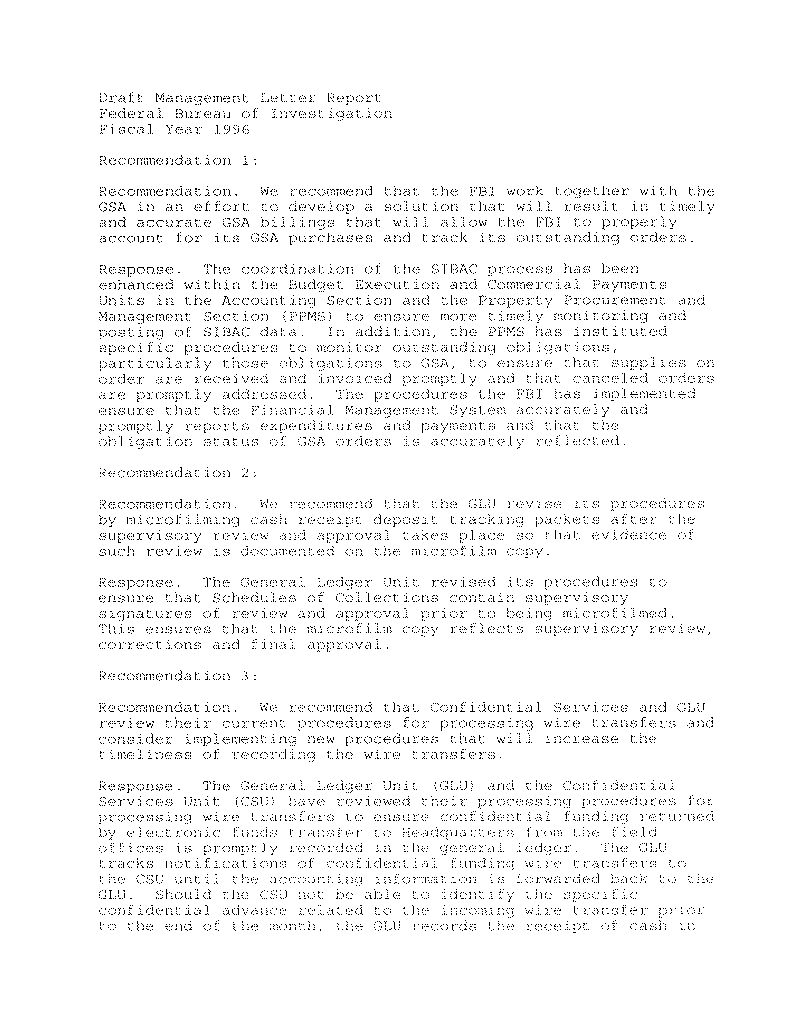
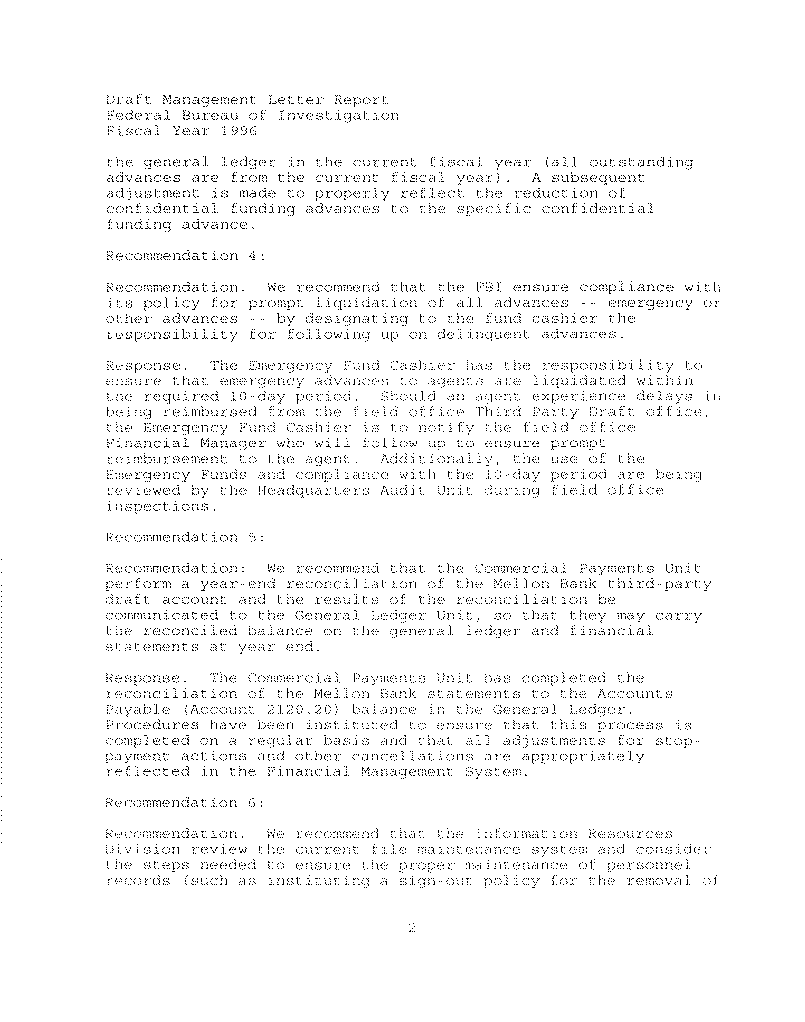
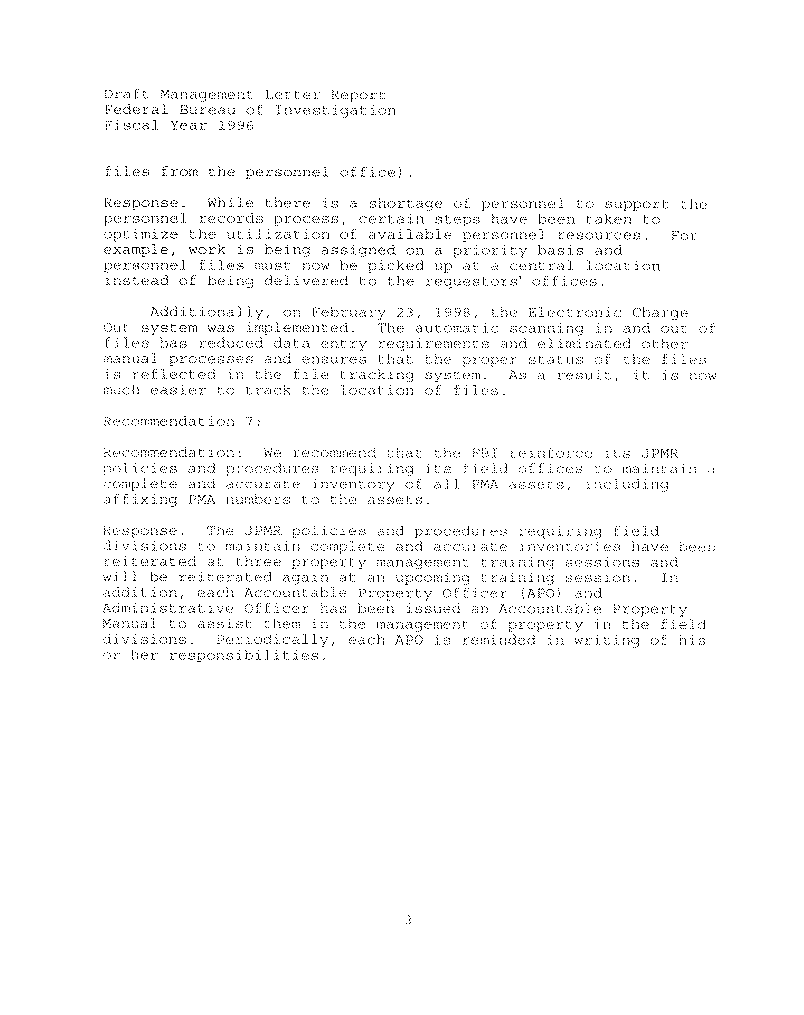
OFFICE OF THE INSPECTOR GENERAL, AUDIT DIVISION
ANALYSIS AND SUMMARY OF ACTIONS NECESSARY
TO CLOSE THE REPORT
Recommendation Number:
#####